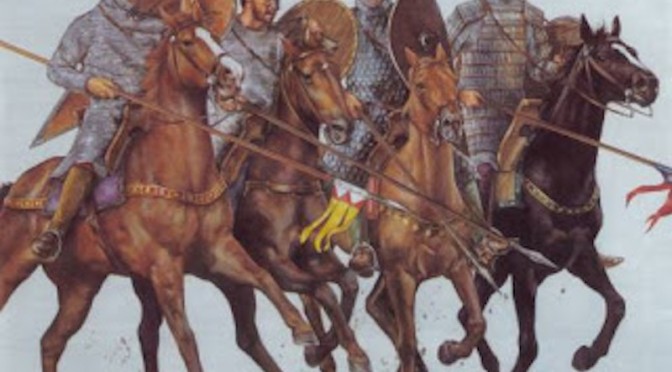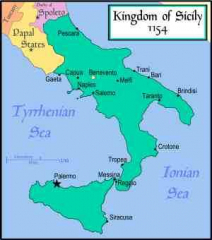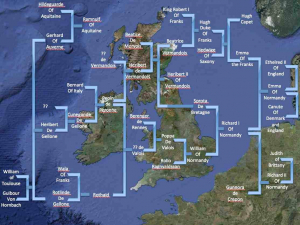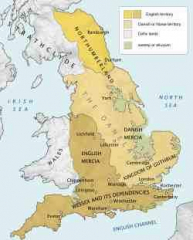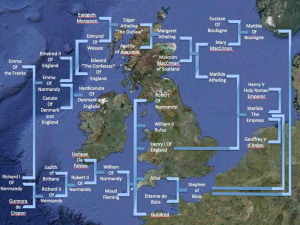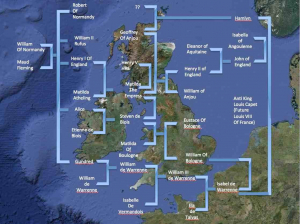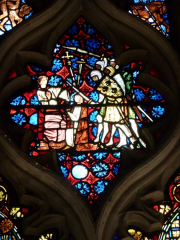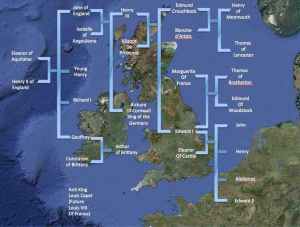The major cause of the demise of the Carolingian kings and their eventual replacement by Hugh Capet was their inability to deal with the Viking invasions of the coasts and river valleys. The solution chosen by the Carolingians and for which they eventually lost their throne was probable the most practical solution.
Give the the most aggressive Vikings land on the north coast but require that they give allegiance to the king of the Franks.The area was Normandy, the Vikings became known as Normans, and they became responsible for controlling other Viking incursions.
The Normans also gave their allegiance to the Church of Rome, who through a series of disjointed initiatives used the Normans to drive the Byzantines and Saracens from Southern Italy and Sicily.
The Pope having finally reached an agreement with the Hauptville and Guiscard families saw the potential to use the normans on a different mission.
The Pope needed a supporter in England. The Anglo -Saxon kings, despite their conversion to Christianity, had been a great disappointment to the Papacy. They had failed to gain control of the whole of the british islands, and more importantly had failed to suppress the earlier, Celtic version of Christianity.
They were now loosing control of the North of England to the Danes.
The Pope reached an agreement with Richard of the Normans that his illegitimate son William would be approved as King of England if in return he helped convert the whole of the British Isles from Celtic to Roman Christianity.This award was a very significant event it was, in effect, a mandate to subjugate Wales, and the various nations of Scotland and Ireland.
William’s genealogy was mainly Scandinavian and Breton. His suitability to be king was judged on a two different descents from the Dagobert line, with female links in both lines.
There is a strong possibility that these lines were “constructed” to give a semblance of logic to the popes decision. Sprota for instance is said to be “a concubine” who is extremely unlikely to have been a daughter of Heribert de Vermandois.
On the other hand Richard did marry Hugh Capet’s sister Emma, but their daughter, also Emma married Ethelred of England, carrying the Wormsgau line into the Anglo-Saxon realm.
Despite the inadequacies in the genealogy, William won the support of the Pope as having the right to rule the British Isles. Publicly he argued his case in terms of what he had been promised by Edward the Confessor. The right to rule was far from clear.
The “England” which William invaded was only just a unified territory. The old kingdoms still existed and there was a network of sub kings. it was only through a combination of Wessex expansionism and Danish invasion that the country was nominally unified.
The racial mix and the tensions associated with it were complicated by the fact that England had also been subdivided into Saxon England and the Danelaw, independent from both the Saxon Kingdom and Denmark, an not christian.
Ethelred “the unready” had, however, married Emma of Normandy and therefore, his son, Edward “the Confessor” also could claim both the Dagobert and Wormsgau lines.
William was accompanied by a large number of supporters with celtic heritage who had relatively recently fled from the Saxons to Brittany and Normandy There is no doubt that they saw the invasion as a means of reclaiming their birthright from the Saxons and were in the short term disinterested in concepts of “Right to Rule”.
William the Conquerors’ son, Henry I (Beauclerk) was aware of the underlying lack of credibility and married Matilda Atheling a great great granddaughter of Emma. Their children therefore did acquire the Wormsgau bloodline. Unfortunately Henry’s son William drowned, which resulted in Matilda his daughter,who was married to Heinrich Salian the Holy Roman Emperor, claiming the kingdom.
Henry I was considered a good civil administrator but had two failings.
He showed little interest in imposing the Pope’s version of Christianity on the Celtic extremities of his kingdom. Indeed Celtic Christianity was being exported to Europe via a well organized system of missionaries.
Henry also had many children, perhaps dozens, but few legitimate children. His only unchallenged, male successor, William the Aethling, was drowned on the White Ship. This was the twelfth century equivalent of the Titanic. It was a large ship of advanced design and over three hundred of Englands finest warriors, their wives and mistresses, died when the ship hit a well known rock at the entrance to Balfleur harbour.
Henry’s remaining legitimate children were female. He had bethrothed his eldest daughter Matilda to the King of Germany at the age of eight. She was married at the age of thirteen and widowed at the age of twenty three. Her husband died in 1125.
For a woman considered by many to be haughty and remote, Matilda also had a repution for giving her favours freely.
There are persistent roumors that during this period she was married to the Holy Roman Emporer she gave birth to a male child who would become one of England’s ablest administrators, ultimately England’s most famous martyr/saint, Thomas a’Becket. Thomas was murdered on the orders of Matilda’s eldest acknowledged son King Henry II of England.
In turn Henrys father was supposed to be Geoffrey of Anjou to whom Matilda was married in 1128.
However Henry was known at the time as “Fitz Empress” a term usually reserved for illegitimate sons. Matilda spent an inordinate time away from her husband.
There was an opinion that one or both of her sons Henry and William, born to Matilda during her marriage to Geoffrey of Anjou, were in fact sired by Stephen of Blois. Stephen had been brought up in the same court as Matilda. They had a love/hate relationship all of their lives.
Stephen was also a grandchild of the conqueror, which explains why he was brought up as one of the family. His mother Alice was the Conquerors daughter. Stephen had a priceless asset, however, he was married to Matilda of Boulogne who was the daughter of Eustace , elder brother of Godfroid of Buillion and Baudwin of Boulogne. Eustace was the most senior in the Dagobert succession and had twice turned down invitations to become King of Jerusalem !
Eustace had married Mary MacCrinon, Princess of Scotland, who was a recipient of the Wormsgau bloodlines. Thus Stephens children by Matilda of Boulogne would carry this bloodline and the Dagobert line. Once again there seems to have been an election and the Pope approved Stephen and his successors by Matilda of Boulongue as kings of the British Isles.
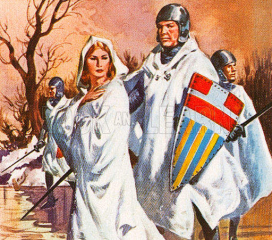 Matilda (1102-67) was the daughter of King Henry I and fought his successor, Stephen, for the throne. She was besieged at Oxford, and escaped in white so that she and her followers would not be seen against the snow.
Matilda (1102-67) was the daughter of King Henry I and fought his successor, Stephen, for the throne. She was besieged at Oxford, and escaped in white so that she and her followers would not be seen against the snow.
Stephen was not even the eldest son of Alice of Normandy. He had two elder brothers! Almost certainly an assessment of the seniority of the bloodline outweighed consideration of the normal laws of succession. Matilda the Empress, regardless of her feelings for Stephen, objected to his acquisition of the throne and civil war ensued. In the civil war which followed, there were periods were Stephen was imprisoned by Matilda and Matilda was imprisoned by Stephen! If They really were lovers this must have given rise to some fascinating situations!
In the meantime Henry had made contact with Eleanor of Aquitaine, who at the time, was in an unhappy marriage to the King of the Franks. Eleanor and Henry made pact that she would separate both from the King of the Franks And Geoffrey and marry Henry. Henry was eighteen at the time, Eleanor twenty nine.
Henry II fought on his mothers side during the latter stages of the civil war, but the war reached a stalemate, with Stephen still in possession of the majority of the kingdom. At that point Stephen agreed to meet Henry and appointed him as his heir. It is said that Stephen “felt sorrow and true affection” for his adversary.
He was probably also inflenced by the fact that his elder son Eustace had died of “food poisoning” whilst campaining in Essex. Nothing to do with Henry of course!
Stephen’s terms were that he should remain as king until his death at which point Henry should take over. His legitimate son William should be compensated by marriage to Isabelle Warrene, the countess of Surrey, the richest heiress in Europe.
If HenryII was Stephen’s son he would have had the Wormsgau line on both sides of the family as well as the Daggobert line. If he were Geoffry of Anjou’s son he would still have the Dagobert line but only one Wormsgau line.
The Pope must have approved the arrangement as there is no evidence of any attempt to place pressure on Henry to give up the realm. Indeed the major surviving document recording communications between the Pope Adrian and Henry II was a papal bull commanding Henry to take possession of Ireland (and suppress the Celtic Church)
The evidence is that Henry chased William de Boulogne, Stephens surviving son, out of the realm. More specifically this separated William from his wife, to prevent the procreation of another generation. A short time afterwards William died. Stephen’s remaing sucessors were both female and out of Henry’s reach.
Henry then tried to marry his brother William Plantagenet to Isabel, Countess of Surrey, William de Boulogne’s widow. Thomas a’Becket who had just been appointed Archbishop of Canterbury forbade the wedding. Formal histories simply say that it was for “frivolous reasons” An examination of all the grounds Becket might have had for banning the marriage reveals there can have been only one reason. The Church bans marriage between a widow and her dead husbands brother. Becket then allowed Isabelle to be married to Hamlyn Plantagent, Geoffry Plantagenet’s illegitimate son by an unknown partner. The inescapable conclusion is that Thomas a Becket believed that William Plantagenet and William of Boulonge were brothers. The only way that could be possible is if they had the same father, Stephen of Blois! Thomas a Becket would have known. Before becoming archbishop of Canterbury he was a chancellor and close friends with the ruling family. Possibly he was yet another half brother!
Further evidence of some deal between Henry II And Stephen was that Henry took the unusual step of having his eldest son crowned king of England relatively early in his life. What was he trying to achieve?
Thomas a‘Becket by this stage had been banned from the kingdom. Nevertheless from abroad he excommunicated all the bishops who had been involved in “young” Henry’s Coronation. Henry II in the middle of a military campaign feined illness for over six months to avoid excommunication for the same “crime”. The only explanation that henry had failed to fulfil some part of this agreement with the Pope and the most obvious candidate was the invasion of the celtic lands Wales, Scotland and Ireland.
Young Henry was never allowed to rule, despite being the crowned King of England!
Finally even before Henry II’s death, young Henry sought the help of the king of the Franks to fight his father. Henry II’s three remaining sons resorted to civil war over the succession. A strange situation when if the whole empire was taken into account, each one could have ruled an independent kingdom, Geoffrey (Normandy, Anjou & Brittany) Richard (Aquitane) John (British Isles). The reason for the war was that they all wanted the overseas possessions.
Richard was nominal king of England for over ten years but actually spent significantly less than six moths in the country. Richard also gave away Normandy, as a gesture of peace in a quarrel with Philip of the Franks.
Geoffrey left as a young man and never returned despite being the heir to the throne for a period.
John eventually inherited the kingdom and spent more time in England than the others but still concentrated his efforts on retaining or expanding his possessions in Aquitaine.
The root of it all was that none of the brothers really wanted to give priority to retaining England or Normandy as they felt their title was insecure.
At the time of John’s death, the son of the king of France was in possession of half of England and had won the barons support. The barons movement probably started as a movement to make a decision on the succession.
There was discontent amongst the constituent barons during the reigns of Henry III, The discontent was generally suppressed by Edward I but arose again under Edward II. the barons never totally accepted the Plantagenets right to rule.
